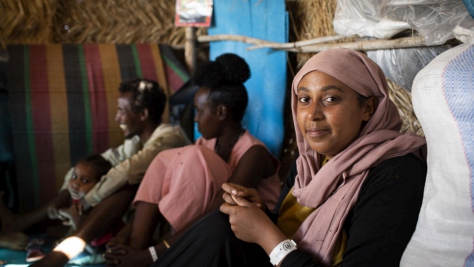UNHCR seeks $13 million to step up response to South-East Asia boat crisis
This is a summary of what was said by UNHCR spokesperson Melissa Fleming – to whom quoted text may be attributed – at today's press briefing at the Palais des Nations in Geneva.
UNHCR is seeking US$13 million to help with the needs of new boat arrivals in South-East Asia, where thousands of refugees and migrants have been crossing the Bay of Bengal and the Andaman Sea.
The appeal was launched yesterday, and is aimed at beefing up our work to do with protection for the nearly 4,800 people from Myanmar and Bangladesh who have been disembarked from smugglers' boats in the last month. In the latest incident, earlier this week, over 700 people were landed in Myanmar's Rakhine state. They included some 120 women and children who said they had been at sea for at least three months.
With the monsoon season imminent, it's estimated that thousands of people may still be at sea.
UNHCR's appeal follows from last Friday's regional meeting of affected States held in Bangkok. It also reflects elements of a 10-point plan of action proposed by UNHCR, the International Organization for Migration and the UN Office on Drugs and Crime.
The funds will allow UNHCR to step up its response in three main areas: Firstly by helping meet the international protection needs of new boat arrivals, secondly by enhancing information available to people considering the journey, and thirdly by targeting some of the root causes of these movements in source countries.
To date, UNHCR's teams have registered just over 1,000 Rohingya new arrivals in Indonesia. In southern Thailand we have distributed relief supplies and are counselling dozens of new arrivals, while in Malaysia we are scaling up to meet the needs of arrivals once consistent access is provided.
Additional resources are needed to set up mobile multi-functional teams to quickly identify and help people with specific protection needs. Refugees who cannot return home will need assurance that they can stay in host countries temporarily with access to legal work until conditions are conducive for voluntary return or until other solutions are found. Where possible, UNHCR will support livelihood programs within national structures to serve the needs of both refugees and host communities.
The appeal envisages trainings for the region's search-and-rescue officials on international legal principles and protection, and exploration of predictable disembarkation options. UNHCR will also expand its monitoring and reporting on maritime movements to include information campaigns providing factual information to potential travelers about the risks and mistreatment at the hands of smugglers and traffickers.
To reduce incentives for people to undertake these dangerous sea journeys, UNHCR will seek legal alternatives such as programs to transition from refugee to migrant status in host countries in need of temporary migrants.
A key part of the appeal focuses on mobilizing support for humanitarian, human rights and development needs in source countries to address the root causes of movement. UNHCR is ready to work with the governments to address issues of citizenship and documentation of people in Bangladesh and in Myanmar's Rakhine state.
To help resolve the three-year-long internal displacement in Rakhine state, UNHCR is seeking to expand assistance to and monitoring of displaced families who wish to return home or establish new homes.
For more information on this topic, please contact:
- In Bangkok, Vivian Tan on mobile +66 818 270 280
- In Geneva, Babar Baloch on mobile +41 79 557 9106
-

15by30 Roadmap - Coming together to achieve 15% enrolment by 2030 (visualized PDF)
23 Mar 2021 This PDF provides a visual summary of the 15by30 roadmap. It highlights where the strategy stems from, what the overall targets are and which actions need to be taken to achieve the goal to increase enrolment in higher education of young refugee women and men to 15% by 2030. -

Tertiary Education 15by30 roadmap - actions across the pathway (visualized PDF)
23 Mar 2021 Five key pathways facilitate access to higher education: national universities, the DAFI scholarship programme, technical and vocational education and training, connected higher education and complementary education pathways for admission to third countries. This PDF visualizes the key actions across each of these pathways – from strengthening partnerships to improving accessibility. -

Tertiary Education 15by30 Roadmap Agenda - Working Across the Five Pathways of Higher Education (visualized PDF)
23 Mar 2021 This PDF visualizes the different working steps that are part of the 15by30 roadmap agenda for higher education. -

UNHCR outraged by deadly attack against displaced population in Western Niger
23 Mar 2021 -

Uprooted in their own land: the internal displacement crisis
23 Mar 2021 With 45.9 million people displaced inside their own countries, a new data visualization reveals the scale of the issue, the latest trends and prospects for lasting solutions. -
Remarks to the 80th Session of the Standing Committee of the Executive Committee of the High Commissioner's Programme
23 Mar 2021 -

Bangladeshi authorities, aid agencies and refugee volunteers rush to respond as massive fire leaves some 45,000 Rohingya refugees without shelter
23 Mar 2021 -

Bain & Company
Bain & Company provides invaluable pro bono support to UNHCR on a range of strategic and organizational topics. It has advised UNHCR on the design and set-up of change management and business transformation capabilities. -

Better access to water improves lives for refugees and their hosts in Zimbabwe camp
22 Mar 2021 UNHCR, the UN Refugee Agency, and partners have improved water supply at Tongogara camp, in a project funded by the African Development Bank.
